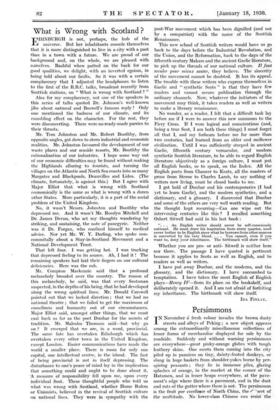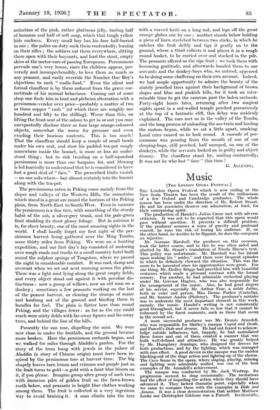Persimmons
IN November a fresh colour invades the brown dusty streets and alleys of Peking ; a new object appears among the extraordinarily miscellaneous collections of lesser forms of merchandise displayed for sale by the roadside. Suddenly and without warning persimmons are everywhere—great pinky-orange globes with tough leathery skins. One meets them coming into the city piled up in panniers on tiny, dainty-footed donkeys, or slung in huge baskets from shoulder-yokes borne by per- spiring peasants ; they lie in immense piles, glaring splashes of orange, in the market at the corner of the Hatamen, and in lesser heaps everywhere, at the pave- ment's edge where there is a pavement, and in the dust and ruts of the gutter where there is not. The persimmon is the fruit par excellence of North China, the e "sert of the multitude. No lower-class Chinese. can resist the • seduction of the pink, rather glutinous jelly, tasting half of bananas and half of soft soap, which that tough yellow hide encloses. Every small boy has his face half-buried in one.; the police on duty suck them contentedly, leaning on their rifles ; the soldiers eat them everywhere, slitting them open with their bayonets, and hurl the stout, empty skins at the motor-cars of passing Europeans. Persimmons pervade one's very house, since the children appear, per- versely and incomprehensibly, to love them as much as any peasant, and easily override the Number One Boy's objections to such " coolie-food." Even the silent and formal chauffeur is by them seduced from the grave cor- rectitude of his normal behaviour. Coming out of some shop one finds him in loud and plebeian altercation with a persimmon-vendor over price—probably a matter of two or three copper " cash " (of which there are roughly one hundred and fifty to the shilling). Worse than this, on lifting the front seat of the saloon to get in or out you may unexpectedly disclose three or four large orange-coloured objects, somewhat the worse for pressure and even exuding their luscious contents. This is too much ! That the chauffeur should keep a couple of small bowls under his own seat, and stow his padded tea-pot snugly somewhere inside the bonnet, is more or less an under- stood thing ; but to risk treading on a half-squashed persimmon is more than one bargains for, and Shwang is led hurriedly to understand that he is considered to have lost a good deal of " face." The proscribed fruits vanish —no one asks where—but almost certainly into the bonnet along with the tea-pot.
The persimmons eaten in Peking come mainly from the slopes and valleys of the Western Hills, the mountains which stand in a great arc round the horizon of the Peking plain, from North-East to South-West. Even in summer the persimmon is a fine tree, with something of the sturdy habit of the ash, a silver-grey trunk, and the,pale-green fruit studding its stout glossy foliage. But in autumn it is, for sheer beauty, one of the most amazing sights in the world. I shall hardly forget my first sight of the per- simmon harvest being gathered near the Ming Tombs, some thirty miles from Peking. We were on a hunting expedition, and our first day's lap consisted of motoring over rough roads and tracks to a small country hotel built round the sulphur springs of Tongshan, where we passed the night in considerable comfort. It was cool, damp and overcast when we set out next morning across the plain. There was a light mist lying along the great empty fields, and every object stood out against it with peculiar dis- tinctness : now a group of willows, now an old man on a donkey ; sometimes a few peasants working on the last of the peanut harvest, or clearing the stumps of maize and kaoliang out of the ground and binding them in bundles for fuel. The plain is flatter here than round Peking, and the villages fewer : as far as the eye could reach were misty fields with far-away figures and far-away trees, and behind the line of the hills.
Presently the sun rose, dispelling the mist. We were now close in under the foothills, and the ground became more broken. Here the persimmon orchards began, and we walked for miles through Aladdin's garden. For the story of the trees hung with jewels in the palace of Aladdin (a story of Chinese origin) must have been in- spired by the persimmon tree at harvest time. The big shapely leaves turn lemon and crimson and purple just as the fruit turns to gold—a gold with a faint blue bloom on it, if you please. Imagine group after group of such trees with immense piles of golden fruit on the fawn-brown earth below, and peasants in bright blue clothes working among them. The fruit is collected in a very ingenious way to avoid bruising it. A man climbs into the tree with a curved knife on a long rod, and lops off the great orange globes one by one ; another stands below holding a piece of linen stretched between two sticks, in which he catches the fruit deftly and tips it gently on to the ground, where a third collects it and places it in a rough round basket, to be carried over and stacked in the pile. The peasants offered us the ripe fruit ; we took them with becoming gratitude, and afterwards handed them to our servants and the donkey-boys who, we noticed, appeared to be doing some chaffering on their own account. Indeed, we had ample opportunity to admire the beauty of the stately jewelled trees against their background of brown slopes and blue and pinkish hills, for it took an inter- minable time to get the caravan past the laden orchards. Forty-eight hours later, returning after two magical nights spent in a red-walled temple perched precariously at the top of a fantastic cliff, this delay was suddenly explained. The cars met us in the valley of the Tombs, and the long process of unloading the ass-train and loading the motors began, while we sat a little apart, smoking. Loud cries caused us to look round. A cascade of per- simmons was pouring from the mouth of one of our sleeping-bags, still perched, half unroped, on one of the donkeys, while the servants looked on in guilty and abject dismay. The chauffeur stood by, smiling contentedly. It was not he who lost " face " this time !
G. ALLENBY,







































 Previous page
Previous page